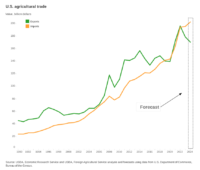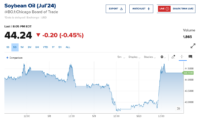Bloomberg's Clarice Couto reported this past Friday that "a surprising tax change in agriculture powerhouse Brazil has the potential to make soy grown in the world’s largest bean exporter less…
China Concerned About Farmers, Countryside as Covid Surges
Late last week, Bloomberg writer Jinglu Gu reported that, “China has asked farmers to avoid large gatherings and send their Lunar New Year greetings virtually to try and curb the impact of a severe wave of Covid-19 in the countryside.
“Disease prevention and control in rural areas has reached its ‘most difficult time’ as the holiday season approaches, the agriculture ministry said in a statement published late Thursday. It recommended farmers get vaccinated, wear masks and send greetings by phone or WeChat rather than in-person.”
In addition, the impact of a major wave in the countryside threatens to hinder the planting and harvesting of crops, which could lead to food shortages and faster inflation. Spring planting usually begins around March, and is important to secure sufficient grain production for the year.
Writing on the front page of Saturday’s New York Times, David Pierson, Joy Dong, Claire Fu and Olivia Wang reported that, “China is bracing for an onslaught of infections in its fragile countryside as millions of migrant workers crowd onto trains and buses to leave factory towns, construction sites and cities, to return to their rural homes for the Lunar New Year holiday. The travel period, which begins Saturday and lasts 40 days, is expected to overwhelm the rural health care system only weeks after hospitals in wealthy cities like Beijing and Shanghai were buckled by the outbreak.

“‘What we are most worried about is that after three years, everyone … can finally go home for the new year to visit relatives,’ Jiao Yahui, an official with China’s National Health Commission, told state media. With the populous countryside’s limited medical resources, she said, ‘how to deal with the peak of infection in vast rural areas has become a huge challenge.'”
Saturday’s article pointed out that, “In China, few things highlight the inequities between urban and rural life as starkly as medical care. Despite ongoing health reforms, access to everything from ventilators to fever medicine remains scant for the 500 million people who live in the countryside. Staffing in rural health facilities is also woefully low. There are 1.3 million physicians and 1.8 million nurses in rural China — roughly less than half as many per 1,000 people as there are in the cities, government statistics show.”
Meanwhile, Reuters writers Joyce Zhou and Yew Lun Tian reported on Sunday that, “Travellers streamed into China by air, land and sea on Sunday, many eager for long-awaited reunions, as Beijing opened borders that have been all but shut since the start of the COVID-19 pandemic.
“After three years, mainland China opened sea and land crossings with Hong Kong and ended a requirement for incoming travellers to quarantine, dismantling a final pillar of a zero-COVID policy that had shielded China’s 1.4 billion people from the virus but also cut them off from the rest of the world.
China's economy is in a slump as covid infections have surged. Bloomberg's @jdmayger explains when we might see a recovery https://t.co/tOPqTzfbX8 pic.twitter.com/VTeQcXIZLS
— Bloomberg Quicktake (@Quicktake) January 6, 2023
“China’s easing over the past month of one of the world’s tightest COVID regimes followed historic protests against a policy that included frequent testing, curbs on movement and mass lockdowns that heavily damaged the second-biggest economy.”
The Reuters article added that, “Investors hope the reopening will reinvigorate a $17-trillion economy suffering its slowest growth in nearly half a century. But the abrupt policy reversal has triggered a massive wave of infections that is overwhelming some hospitals and causing business disruptions.”
Elsewhere, Bloomberg writer Agnieszka de Sousa reported late last week that, “China’s relaxing of Covid restrictions will be watched by everyone. For foodstuffs from meat to vegetable oils, it should mean a jump in demand there as people regain confidence to dine out and travel. But the rampant spread of the virus has kept that suppressed for now.”







